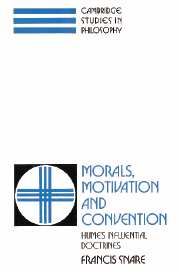Book contents
- Frontmatter
- Contents
- Acknowledgements
- NOTE
- Introduction
- Part I The argument for sentimentalism
- 1 A systematic ambiguity
- 2 The influence argument
- 3 Some bad reasons for believing the first premiss
- 4 The Humean theory of motivating reasons
- 5 The provocative Humean theory of motivation
- Part II The problems and consequences of sentimentalism
- Bibliography
- Index
2 - The influence argument
Published online by Cambridge University Press: 05 June 2012
- Frontmatter
- Contents
- Acknowledgements
- NOTE
- Introduction
- Part I The argument for sentimentalism
- 1 A systematic ambiguity
- 2 The influence argument
- 3 Some bad reasons for believing the first premiss
- 4 The Humean theory of motivating reasons
- 5 The provocative Humean theory of motivation
- Part II The problems and consequences of sentimentalism
- Bibliography
- Index
Summary
Hume's arguments for sentimentalism are, for the most part, arguments for the large negative component of that thesis, viz. something close to non-cognitivism. Hume no doubt thought that the difficult part was to prove that moral distinctions are ‘not derived from reason’. After that, the defence of the further thesis that moral distinctions are a matter of sentiment might be just a matter of putting forward the only remaining plausible hypothesis, a matter of inference to the best explanation. Three discussions to be found in Hume's discussion (III,i,1) have been enormously influential in contemporary thinking about non-cognitivism. The third in order of Hume's presentation (469–70) is an observation about ‘is’ and ‘ought’. In my view it is really a non-argument. Either Hume's discussion should not be taken as an independent argument at all or it should be discarded as a very bad argument indeed. This has not kept the relevant passage from being very influential just on its own. The second in Hume's order (463–69), the empiricist argument, depends on an application of Hume's specific epistemology developed in Book I of the Treatise. While Hume's specific epistemology may no longer be tenable, the general epistemological approach remains influential. Thus the same kind of argument for non-cognitivism can be given over and over again starting from new empiricist theories almost as soon as an old one has been scrapped. The first argument in Hume's presentation (457–58), the influence argument, relies on what seems to be an everyday observation that one's moral judgments have some capacity to influence one's feelings and behavior.
- Type
- Chapter
- Information
- Morals, Motivation, and ConventionHume's Influential Doctrines, pp. 34 - 64Publisher: Cambridge University PressPrint publication year: 1991

